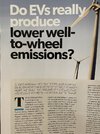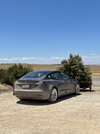Nice looking car compared to them dog ugly TeslasI found this article interesting, some real life figures for the Hyundai ioniq5, with AC off and AC on.

You Asked, We Answered: Here's What You Wanted To Know About The Hyundai Ioniq 5 | Carscoops
The Hyundai Ioniq 5 is one of the most compelling EVs currently on salewww.carscoops.com
Electric cars?
- Thread starter tothemax6
- Start date
-
- Tags
- car electric car
- Joined
- 3 July 2009
- Posts
- 28,203
- Reactions
- 25,448
Due to regulation and the push to clean energy, it is inevitable that ICE engined vehicles will become a cottage industry and no multinational company will want to be caught in that niche.Do we need a thread for electric trucks now?
Nikola in USA are well behind where they hoped to be with FCETs - (T = trucks) - but the business model they are working looks like being successful as they are using a "hub" where the "spokes" are predetermined destinations.
Looks like the USA is behind Europe in FCETs and behind China in NEVs.
On the topic of cars and the pivot to NEVs, Hyundai's intention is clear and ICEVs are dead in their factories. I was going to post more on the various companies that are discontinuing ICE models in favour of NEVs but the list is literally as long as the number of companies making cars, full stop.
The advantages of EV's over ICE production for the manufacturer's is just too compelling to ignore, so as is happening already manufacturer's are pushing up the price of their ICE powered vehicles, to take the price difference out of the equation.
Whether we need another thread on trucks IMO is debatable, because the issue is more about the EV process rather than the size of vehicle at the moment.
The motive force is the same, just where the electricity is sourced from differs, batteries or fuel cells.
- Joined
- 29 January 2006
- Posts
- 7,226
- Reactions
- 4,468
Hard to believe the pivotal year arrived as early as it did.Due to regulation and the push to clean energy, it is inevitable that ICE engined vehicles will become a cottage industry and no multinational company will want to be caught in that niche.
The advantages of EV's over ICE production for the manufacturer's is just too compelling to ignore, so as is happening already manufacturer's are pushing up the price of their ICE powered vehicles, to take the price difference out of the equation.
Whether we need another thread on trucks IMO is debatable, because the issue is more about the EV process rather than the size of vehicle at the moment.
The motive force is the same, just where the electricity is sourced from differs, batteries or fuel cells.
Sadly, Australia is a non starter in the transition. We're not building anything except charging points, and have no policies beyond some State government tax concessions to get us into this clean energy future.
Maybe Twiggy can get us into hydrogen early enough to make FCEVs dominant in Oz by 2030. Really makes sense here where massive transport distances are involved for trucking, and that infrastructure build would enable FCEV to be rolled out without the range anxieties that pervade BEV detractors.
Last count on US battery factory commitments was 15 so Ford and GM in particular have finally got serious.
Then in Shanghai we have CATL building a 70GWh battery factory nearby Tesla's manufacturing plant. So maybe that's going to feed in to their planned US$25K Tesla?
- Joined
- 3 July 2009
- Posts
- 28,203
- Reactions
- 25,448
This should bring about some changes in the EV space, maybe a lot more consolidation and rationalisation, my guess a higher probability of a Chinese EV company buying out a western company than vice versa.
Could well be a clever move by China to reduce chances of tarrifs and encourage more centralised production in China as opposed to the EU and U.S.
Which on cost fronts makes a lot of sense, when battery costs are a major factor, but then I guess we end up with the same problem as usual only one source of an essential product.

 www.drive.com.au
www.drive.com.au
Could well be a clever move by China to reduce chances of tarrifs and encourage more centralised production in China as opposed to the EU and U.S.
Which on cost fronts makes a lot of sense, when battery costs are a major factor, but then I guess we end up with the same problem as usual only one source of an essential product.
China lifts foreign ownership restrictions for car manufacturers
Chinese limits on foreign investment in its auto companies will be removed in 2022.
Last edited:
- Joined
- 14 February 2005
- Posts
- 15,505
- Reactions
- 18,175
I liked your post even though I disagree with some points.Because these users will put convenience first as they will not pay the costs and will not..well should not, be parked during the 7am to 6pm window.
If they are,they should not have company cars..
A business can well need vehicles that are used intermittently throughout the day.
Pool vehicles in an office situation are a classic example of that. Someone goes to meet with a client and takes the car but it's not in use all day every day. It'll be parked a portion of the time during business hours and an "always plugged in when at the office" policy fixes any charging issues, noting that from experience the biggest single problem with such vehicles at present is staff not putting petrol in them.
Any worker who is partly field based and part office based but is out and about often enough to have a car for their use specifically will be much the same. The car's parked a portion of the day, and it's parked overnight.
Management vehicles for their business and private use are another one. They'll be parked much of the time in practice since they're effectively a personal possession despite technically being company property.
I've worked with all three of those situations personally and they exist in both the public service and private enterprise.

JohnDe
La dolce vita
- Joined
- 11 March 2020
- Posts
- 4,578
- Reactions
- 6,745
Wheels magazine has quite a bit to say about EVs this month. I’ll be reading it this week, while we’re away on holidays.
Just unloaded the Tesla after a pleasant 5 hour drive
Just unloaded the Tesla after a pleasant 5 hour drive
Attachments
- Joined
- 3 July 2009
- Posts
- 28,203
- Reactions
- 25,448
Trains getting in on the fuel cell act.

 www.abc.net.au
www.abc.net.au
Green trains coming to power one of the world's mining centres
A global mining organisation and an Australian freight operator have teamed up to make one of the most resource-rich regions in the world a little greener.
Value Collector
Have courage, and be kind.
- Joined
- 13 January 2014
- Posts
- 12,263
- Reactions
- 8,524
Another good day for renewable generation in Australia, Huge amounts of solar being generated, and some wind and hydro.Some great points in a country by country analysis. But I think the pertinent point as far as the video is concerned, is in relation to Australia.
if we are genuine about reducing overall emissions then we must look at the situation here, and not in Iceland or wherever. Therefore,EVs may increase emissions in our country even if they would reduce emissions in another country.
That would be counterproductive.
As ever, the situation is always far more complicated than the narrative suggests, notwithstanding arguments about the actual narrative.
Thusly, Cadogan's argument as far as Australia is concerned is probably spot on.
Queensland is burning the most coal, but even it is about 50% renewables.
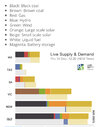
- Joined
- 20 July 2021
- Posts
- 12,601
- Reactions
- 17,503
Tesla recalls half a million US cars

Tesla recalls half a million US cars
AUSTIN, RAW – Tesla Inc is recalling more than 475,000 of its Model 3 and Model S electric cars to address rearview camera and trunk issues that increase the risk of crashing, the US road safety regulator said. The US electric vehicle manufacturer is recalling 356,309 2017-2020 Model 3 vehicles...
 thebull.com.au
thebull.com.au
- Joined
- 3 July 2009
- Posts
- 28,203
- Reactions
- 25,448
Interesting concept in France, electric scooter that uses a fuel cell, supplied by a swappable H2 canister.
 cleantechnica.com
cleantechnica.com
Hydrogen Scooters With Swappable Cans Power Forward in France
Hydrogen Scooters With hot-Swappable Can technology Power Forward in France with the new Mob-ion scooter concept.
 cleantechnica.com
cleantechnica.com
- Joined
- 8 June 2008
- Posts
- 13,691
- Reactions
- 20,394
And no need for lithiumInteresting concept in France, electric scooter that uses a fuel cell, supplied by a swappable H2 canister.
Hydrogen Scooters With Swappable Cans Power Forward in France
Hydrogen Scooters With hot-Swappable Can technology Power Forward in France with the new Mob-ion scooter concept.cleantechnica.com
- Joined
- 28 May 2020
- Posts
- 7,029
- Reactions
- 13,658
China has announced that it is phasing out subidies for New EV's.
From Zero Hedge
From Zero Hedge
MickThere's no doubt that new energy vehicle growth in China has been off the charts. Despite lackluster auto sales numbers heading into the backend of 2020, NEV sales continued to grow, rising 121% in November.
Additionally, the playing field of EV companies in China has become massive. The country leads the world in sheer number of major EV players, all jostling for position in what is still a burgeoning industry.
This saturation and sales growth could be why China's Ministry of Finance, along with several other ministries, has announced that subsidies for new energy vehicles (NEV) in China will be slashed 30% heading into 2022. The subsidies are expected to be phased out by 2023, CNEVPOST reported.
For some areas, like city buses, cabs and postal deliveries, subsidies will only be slashed by 20% heading into 2022.
But more importantly, "the policy will not continue to be implemented starting in 2023," the report said.
Grace Tao, Tesla's global vice president, told The Beijing News earlier this week that the NEV industry is has become more "mature" and that rolling back subsidies will place a focus on product strength.
"This is good for the whole industry, for consumers," she commented.
Recall, Chinese auto sales have fallen for the last seven months of 2021, we wrote in mid-December.
Sales were down 9.1% from the year prior as the industry continued to struggle with what is now becoming a year's long semiconductor shortage and the country posted total sales of 2.52 million vehicles in November, once again led by sales of new energy and electric vehicles.
Total new energy vehicles grew 121% to 450,000 units from the year prior, helped along by the government pushing to further rein in pollution. New energy vehicles include battery-powered electric vehicles, plug-in petrol-electric hybrids and hydrogen fuel-cell vehicles, Reuters wrote.
CAAM spokesperson Chen Shihua commented: "Consumer acceptance of new energy vehicles continues to rise. The market has shifted from policy-motivated to demand-driven."
Among the top sellers in China were Tesla, who sold 52,859 vehicles (which we highlighted analyst analysis of days ago) and Nio, who sold a record 10,878 cars last month. Xpeng sold 15,613 vehicles and Volkswagen sold over 14,000 of its ID series electric vehicles.
JohnDe
La dolce vita
- Joined
- 11 March 2020
- Posts
- 4,578
- Reactions
- 6,745
Good news for Tesla.
As China cuts support for its electric carmakers, auto firms could face a ‘war of attrition’
Less competition form government funded EV manufacturers' is what Elon Musk has been calling for.
https://www.cnbc.com/2019/06/19/chi...ic-carmakers-could-lead-to-consolidation.html
- Joined
- 29 January 2006
- Posts
- 7,226
- Reactions
- 4,468
Chinese NEV car subsidies in 2022 are not that significant from our Western perspective (less than typical GST) but clearly make a big differences where wages are much less:Good news for Tesla.
Less competition form government funded EV manufacturers' is what Elon Musk has been calling for.
https://www.cnbc.com/2019/06/19/chi...ic-carmakers-could-lead-to-consolidation.html
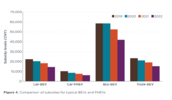
As the above link indicates, the subsidy is conditional on price and technical factors, so lower end manufacturers (such as on Alibaba) seldom qualified from what I have worked out. On the other hand, some better selling lower end vehicles upped their specs in 2021/22 to qualify for subsidies.
There's also a really interesting twist that puts NIO in perspective: Vehicles with battery-swapping functions are exempted from the limit on vehicle price, to promote the technology and battery swapping as a business model.
The other point to bear in mind is that subsidies will be limited to 2 million NEVs in 2022 and this cap is likely to be reached in the 3rd quarter.
Garpal Gumnut
Ross Island Hotel
- Joined
- 2 January 2006
- Posts
- 14,064
- Reactions
- 11,238
One of the most interesting articles in The Spectator ( The UK version ) this year was by Jonathan Miller in April detailing his woes with the Hyundai Kona and Hyundai's lack of response to his concerns. He lives in France by the way and found it difficult to find charging stations as many closed down due to inefficiency and his house was blacked out on two occasions when his wife boiled the kettle while he was charging the vehicle.
I have been to France and it is not the biggest country through which to drive.
He spent a fortune on buying the car in the belief that he was helping the planet. Which I believe to be a good thing. I cannot think of any other planet I'd like to save more than Mother Earth.
I find it difficult to imagine how people in Australia outside of three or four major metropolitan centres will be able to manage owning an electric car, given the distances that people in the regions travel.
As to cost, only a very few such as pharmacists, doctors, colourful characters of low and high repute, night-club owners, restaurant owners, illicit drug importers, leaders of churches who collect, politicians and board members of failing large companies will be able to afford an EV, let alone run one, even in the major metropolitan centres.
I am not against EV, however feel that the man with the red flag who walked in front of the original internal combustion engine cars is waving a flag. A very red flag on EV. The infrastructure needs to keep up with the vehicle.
gg
I have been to France and it is not the biggest country through which to drive.
He spent a fortune on buying the car in the belief that he was helping the planet. Which I believe to be a good thing. I cannot think of any other planet I'd like to save more than Mother Earth.
I find it difficult to imagine how people in Australia outside of three or four major metropolitan centres will be able to manage owning an electric car, given the distances that people in the regions travel.
As to cost, only a very few such as pharmacists, doctors, colourful characters of low and high repute, night-club owners, restaurant owners, illicit drug importers, leaders of churches who collect, politicians and board members of failing large companies will be able to afford an EV, let alone run one, even in the major metropolitan centres.
I am not against EV, however feel that the man with the red flag who walked in front of the original internal combustion engine cars is waving a flag. A very red flag on EV. The infrastructure needs to keep up with the vehicle.
gg
JohnDe
La dolce vita
- Joined
- 11 March 2020
- Posts
- 4,578
- Reactions
- 6,745
I find it difficult to imagine how people in Australia outside of three or four major metropolitan centres will be able to manage owning an electric car, given the distances that people in the regions travel.
As to cost, only a very few such as pharmacists, doctors, colourful characters of low and high repute, night-club owners, restaurant owners, illicit drug importers, leaders of churches who collect, politicians and board members of failing large companies will be able to afford an EV, let alone run one, even in the major metropolitan centres.
I am not against EV, however feel that the man with the red flag who walked in front of the original internal combustion engine cars is waving a flag. A very red flag on EV. The infrastructure needs to keep up with the vehicle.
gg
I almost fell off my chair laughing. You are tacking the mickey, right?
I’m not a doctor nor a pharmacist and definitely not a ‘colourful character’, but I do own an EV sin July 2021.
My partner and I are currently on holidays and traveling through regional Australia. We’ve been in a coastal town with a population of about 4000, and staying in a small but comfy cabin. To charge our EV we use an extension cord and a 10A socket from the cabin, we’ve even left the A/C on in the cabin and used the kettle at the same time, we even threw caution to the wind & turned the television on and the bedroom fan ?
Seriously, and please don’t take any offence from this, but if we made investment decisions by reading an article and jumping to a few conclusions, we’d be broke.
Electrical infrastructure is always being upgraded, 40 years ago only a wealthy family could afford ducted A/C, and the A/C pricing dropped and wages went up. Soon there was A/C being fitted to most houses and the electricity grid had to be upgraded to keep up.
Most EVs have software that can adjust the charging rate. My EV can detect and adjust the safe current draw. I have charged from many locations in county towns, Staying in some very old accommodation, and not once has our EV caused a blackout.
wayneL
VIVA LA LIBERTAD, CARAJO!
- Joined
- 9 July 2004
- Posts
- 26,120
- Reactions
- 13,591
FFS don't live in the Perth hills, the power will never be on long enoughI almost fell off my chair laughing. You are tacking the mickey, right?
I’m not a doctor nor a pharmacist and definitely not a ‘colourful character’, but I do own an EV sin July 2021.
My partner and I are currently on holidays and traveling through regional Australia. We’ve been in a coastal town with a population of about 4000, and staying in a small but comfy cabin. To charge our EV we use an extension cord and a 10A socket from the cabin, we’ve even left the A/C on in the cabin and used the kettle at the same time, we even threw caution to the wind & turned the television on and the bedroom fan ?
Seriously, and please don’t take any offence from this, but if we made investment decisions by reading an article and jumping to a few conclusions, we’d be broke.
Electrical infrastructure is always being upgraded, 40 years ago only a wealthy family could afford ducted A/C, and the A/C pricing dropped and wages went up. Soon there was A/C being fitted to most houses and the electricity grid had to be upgraded to keep up.
Most EVs have software that can adjust the charging rate. My EV can detect and adjust the safe current draw. I have charged from many locations in county towns, Staying in some very old accommodation, and not once has our EV caused a blackout.
- Joined
- 14 February 2005
- Posts
- 15,505
- Reactions
- 18,175
The thing about EV's is that by their very nature they're an energy storage device. Unlike say lighting which needs to draw electricity in real time.the electricity grid had to be upgraded to keep up
That storage aspect opens up the very real possibility to intentionally charge when there's spare capacity available, thus avoiding or at least minimising the need for costly upgrades to infrastructure.
As a concept it's much the same as saying that if a great big heavy load has to be transported, and it simply has to go down a major arterial road at a practical speed of 10 km/h, well then doing it between midnight and 6am when few if any others are using the road sure beats trying to do it at 8am on a weekday. Same concept. By intentionally applying a major load such as EV charging at a time when overall consumption is low, it avoids the need for upgrades.
The key is actually doing it and that's where some risk does exist since, without being pushed or given an incentive, nothing's really enticing consumers to do so. It's possible but it needs to actually happen.

Value Collector
Have courage, and be kind.
- Joined
- 13 January 2014
- Posts
- 12,263
- Reactions
- 8,524
I have owned my car for over two years now, and I simply charge at home from a standard power point, on road trips I have never found there to be a shortage of chargers, and their numbers are growing all the time anyway.One of the most interesting articles in The Spectator ( The UK version ) this year was by Jonathan Miller in April detailing his woes with the Hyundai Kona and Hyundai's lack of response to his concerns. He lives in France by the way and found it difficult to find charging stations as many closed down due to inefficiency and his house was blacked out on two occasions when his wife boiled the kettle while he was charging the vehicle.
I have been to France and it is not the biggest country through which to drive.
He spent a fortune on buying the car in the belief that he was helping the planet. Which I believe to be a good thing. I cannot think of any other planet I'd like to save more than Mother Earth.
I find it difficult to imagine how people in Australia outside of three or four major metropolitan centres will be able to manage owning an electric car, given the distances that people in the regions travel.
As to cost, only a very few such as pharmacists, doctors, colourful characters of low and high repute, night-club owners, restaurant owners, illicit drug importers, leaders of churches who collect, politicians and board members of failing large companies will be able to afford an EV, let alone run one, even in the major metropolitan centres.
I am not against EV, however feel that the man with the red flag who walked in front of the original internal combustion engine cars is waving a flag. A very red flag on EV. The infrastructure needs to keep up with the vehicle.
gg
In regards to the Kona owner that over loaded his household circuit, this can be fix in tways.
1, have an electrician install a dedicated line from your switch board to a power point or charger in your garage.
2, set the car to charge at a slower rate, ( I don’t know if the Kona has this function, but you can select how many amps you want your Tesla to draw, if you are worried about over loading an exisiting circuit.
3, charge at night while no one is using the kettle hahaha.
when it comes to regional Australia, home charging would get you a 500km round trip, which would be ok for the vast majority, and if you need to drive more than 500kms it’s hard to believe you wouldn’t be passing a charger along the way, which you can stop at for a few minutes to boost the battery up enough to get you home (you don’t have to fill up to 100%, because you will do that when you get home)
- Joined
- 29 January 2006
- Posts
- 7,226
- Reactions
- 4,468
If you don't believe in unicorns, then these 3 - Li Auto, Xpeng, and NIO - might give people contemplating EVs something to think about:
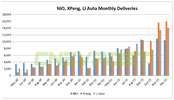
The big mover is clearly Xpeng.
EV watchers expect their production numbers to double again this year, although NIO relies on 3rd party manufacture via JAC and is upgrading its production capacity.
I don't think any of the above models are coming to Australia in 2022.

The big mover is clearly Xpeng.
EV watchers expect their production numbers to double again this year, although NIO relies on 3rd party manufacture via JAC and is upgrading its production capacity.
I don't think any of the above models are coming to Australia in 2022.


